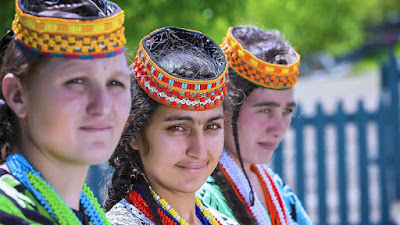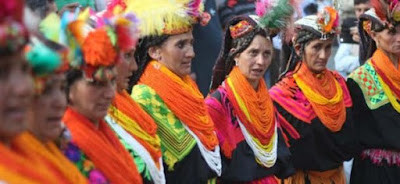Kalash Culture:
The Kalash (also known as the Kalasha) are an indigenous people living in what is today Pakistan. Although Pakistan is an Islamic Republic, with more than 95% of its population being adherents of Islam, the Kalash hold on to their own religious beliefs, along with their own identity, way of life, and language. The Kalash people are also noted for their fair skin and blue eyes, leading to a popular hypothesis that they were of Greek origin, specifically the descendants of Alexander the Great’s soldiers who followed him on his campaign in India.The Kalash can be found in the Chitral District, which is situated in the northwestern Pakistani region of Khyber Pakhtunkhwa. They live in three specific valleys in this area, Bumboret, Birir, and Rumbur. In an article from 2016, it was estimated that the Kalash community consists of about 3000 people, which makes them the smallest minority group of Pakistan. Nevertheless, this group is best-known for their unique and well-preserved culture, which has led to it being listed by UNESCO for consideration as an Intangible Cultural Heritage . As a matter of fact, this bid for recognition is an attempt by the Kalash to safeguard their culture.
The unique nature of the Kalash culture has also allowed these people to turn to tourism as a source of income. Scholars, specifically sociologists, anthropologists and historians, as well as photographers, are particularly drawn to the Kalash, and many visit them each year. In the 1990s, for example, thousands of people visited the area annually, though these figures have dropped since 9/11. One aspect of the Kalash that fascinates these scholars and tourists is their origin.
Origin of the Kalash People
There are two major hypotheses regarding the ancestry of the Kalash. One is that they are the descendants of the Greek soldiers who followed Alexander the Great on his Indian campaign. This link between the Kalash and the Macedonian king is perhaps best seen in Rudyard Kipling’s well-known story, The Man Who Would be King , in which this supposed connection forms the basis of the tale.
In 2014, geneticists looked into the claims and they found that the Kalash people do have portions of their DNA coming from ancient European populations. And when Kalash elders discuss their ancestors’ epics at festivals, they often mention a man they believe was one of Alexander’s generals, Shalakash, who they say settled in the region. Some scholars have suggested the name may refer to Seleucus Nicator , one of Alexander’s generals who did rule over the region after the Greek armies had departed.
Furthermore, the names of Kalash deities also resembles Greek gods and goddesses and there are many words in the Kalash language (also called Kalasha) which resemble Greek words. But this language has no script to compare to Greek and the traditional Kalash stories are passed down orally.
Alternatively, it has been hypothesized that the Kalash are of Indo-Aryan stock. A 2015 study suggested that the Kalash have genetic linkages to Paleolithic Siberian hunter-gatherers “and might represent an extremely drifted ancient northern Eurasian population that also contributed to European and Near Eastern ancestry.” This research did not support the idea that the Kalash people have any link to Alexander’s soldiers . There is also a belief among many Kalash people that their ancestors arrived in the region from an unknown land called Tsiyam, which may have existed in southeast Asia . But no one can say for certain where exactly it was located.
Kalash Religious Tensions
When compared to their Muslim compatriots, the Kalash have a strikingly distinct lifestyle and culture. For example, the way Kalash women behave, and the rights they have, is quite different from the conservative Islamic outlook held by their neighbors. Kalash women are allowed to marry whomever they wish, to divorce their husbands, and even to elope.
The Kalash are polytheistic and continue to practice their ancient pagan religion. In Kipling’s The Man Who Would be King , the Kalash who held onto their ancient ways were referred to as the ‘black kafirs’, a term Kalash people dislike, whereas their neighbors, i.e. the Kalash who were brutally converted to Islam by a campaign of the Afghani ruler Abdur Rahman Khan at the end of the 19th century, were known as the ‘red kafirs’. They became known as the Nuristanis (meaning ‘enlightened ones’) following their conversion.
Indeed, conversion to Islam has become one of the issues afflicting the Kalash people today. There is pressure, both direct and indirect, to convert the Kalash to Islam. The former, for instance, involves extremists who prey on the weak, and create internal division between the Kalash, whilst the latter involves the promise for better treatment and services for converts. At times, this issue even erupts in violence. In 2016, for example, it was reported that clashes broke out due to a row over a teenage girl’s conversion to Islam and since then, Pakistani authorities have banned Tablighi (a Sunni Islam missionary movement) from entering the valley where the violence occurred.




Comments
Post a Comment